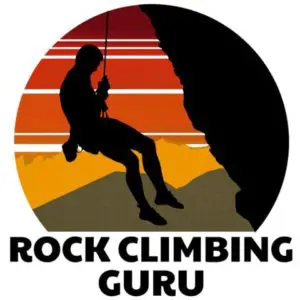If you have seen climbers before, you most likely have seen them reach into a pouch and put chalk on their hands. Some climbers use chalk so liberally that they even end up covered in the stuff from head to toe. What is the point of chalk in climbing and why do climber use it so often?
Climbers use chalk to improve their grip on rock climbing holds. Chalk acts as a drying agent and prevents sweat from accumulating on climbers’ hands. The decrease in moisture increases the friction between the climbers’ hands and the hold allowing them to get a better grip.
Chalk has become engrained into the lifestyle that is climbing. Although chalk is widespread throughout the community, its is starting to become a bit controversial as some have questioned its effectiveness and whether or not it is healthy for the climbers and the environment. Find out exactly how chalk works in climbing and if you even need to use it.
If you are interested in seeing what the current prices are for the most popular rock climbing chalk bags, you can find them on Amazon by clicking here. Using the Amazon affiliate link above and/or other links in the article helps support this website.
How Climbing Chalk Helps Climbers
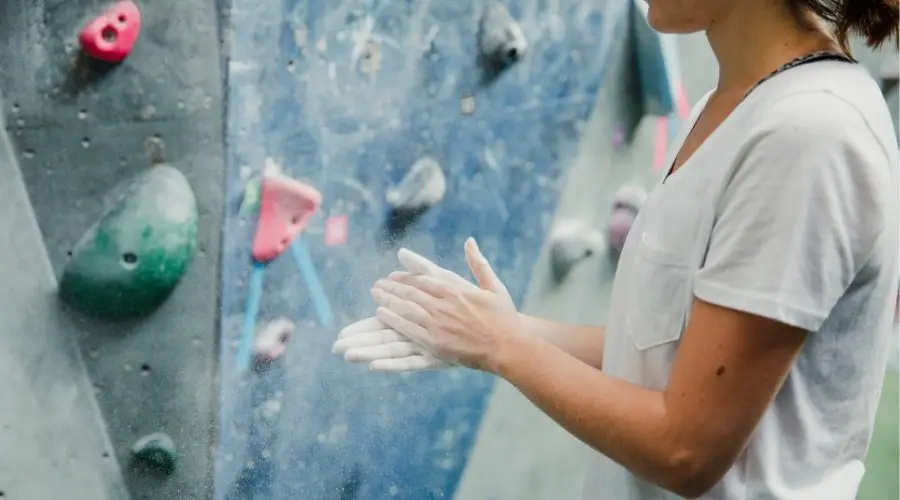
You will probably be able to spot a climber who was just recently at the gym or crag by the amount of chalk that they have on them. Chalk is infamous for getting everywhere, even places it has no business being.
There are three main types of chalk: block, loose, and liquid. Block and loose chalk are the most commonly used versions in the climbing community to date. Liquid chalk is a relatively recent development and is starting to become more frequently used as time goes on.
The various types of chalk are widely used by everyone in the climbing community from first time climbers all the way up to professionals. I personally have never heard of a high-level climber that does not use chalk to some degree. It is one of the most integral pieces of gear that climbers have.
Chalk is a Drying Agent
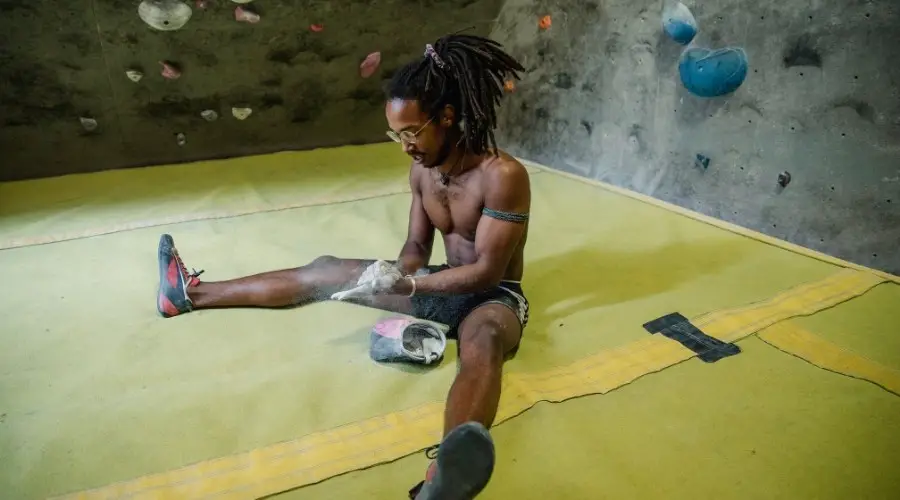
Climbing chalk is composed of magnesium carbonate (MgCO3). High purity magnesium carbonate is commonly used for antacids and as an additive in table salt. In addition to this, it is a highly effective drying agent.
Dry agents perform just as their name implies. They absorb liquids and dry out the environment/substance they come in contact with. A common drying agent is the silica gel packs that are commonly found in food packaging to keep the item from molding (i.e. beef jerky).
Climbers are obviously not using chalk to prevent mold from forming on food, they are using it to dry out the skin on their hands.
We live in a world where athletes are performing at such high levels that they need to take advantage of every tool at their disposal. As such, chalk is being used by elite athletes in other sports outside of climbing for its drying effects. Notably, it is used by gymnasts and weight lifters to give them that little extra edge they need.
Climbing Chalk’s Effect on Friction
Climbing with very sweaty hands can be similar to trying to catch a greased pig – near impossible. Holds that normally wouldn’t be an issue become extremely challenging. I have slipped off climbing holds countless times because my hands were too sweaty. Chalk fixes this problem for many climbers.
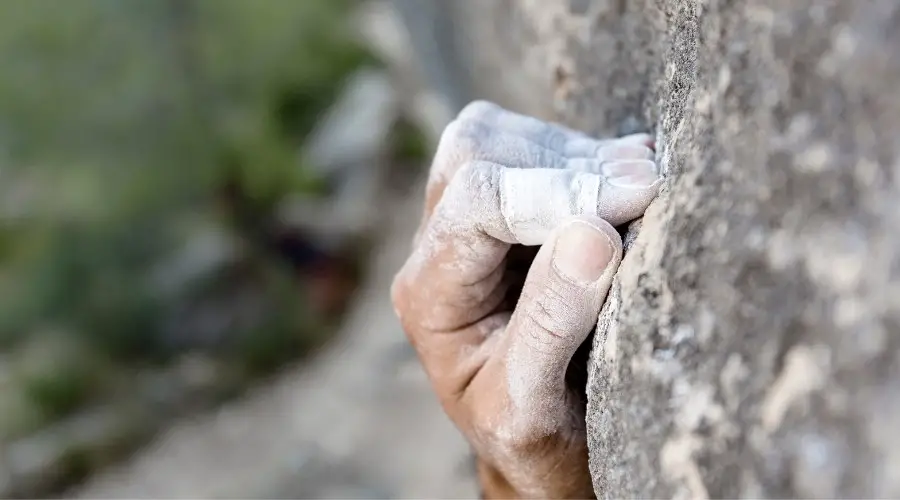
Chalk increases the amount of friction between the climber’s hand and the climbing hold due to its ability to wick away sweat and moisture. Increased friction improves a climber’s grip and prevents their hand from slipping off of holds.
rockclimbingguru.com
Not every climber will sweat the same amount per given activity. Some climbers are just more naturally sweaty than others. On top of this, more sweat is produced climbing in hot, humid environments than in cooler ones. The amount of chalk needed to wick away the moisture will vary on how much sweat the climber is producing. More sweat requires more chalk.
It should be noted that chalk doesn’t just magically make the moisture disappear. Because the chalk is absorbing the liquid, there is a limit to how much sweat/moisture can be absorbed. If this limit is exceeded you will have to deal with wet chalk. Which is gross. Find out why in my article linked here.
Is Chalk Necessary For Climbing
The first few times I went climbing I did not own a chalk bag and didn’t rent one either. My friend and I ended up “borrowing” chalk from some friendly climbers at the gym. We definitely noticed the difference immediately after applying it. The difference was so notable in fact that we quickly became obsessed. Chalk was powdered gold to us. We wanted all of the chalk. No, we needed all of the chalk. It would be fair to say we got a little carried away.
Not too long after we started, we both owned our own chalk bags and bought loose chalk in bulk. We no longer could blame our falls on our “hands just slipping” off the holds. The chalk gave us so much friction and grip that it took away our favorite excuse from us.
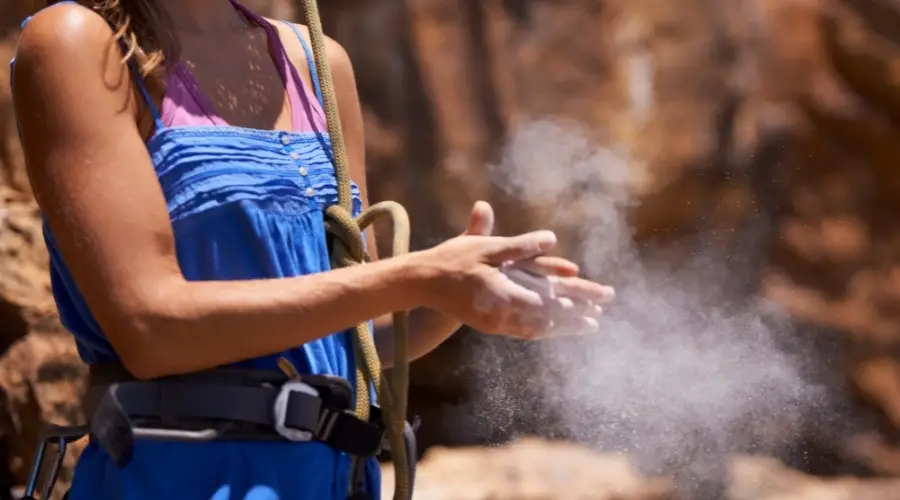
Chalk may not be necessary for rock climbing but it certainly is helpful. If you have never tried climbing with chalk, I highly recommend trying it out.
As I mentioned above, some climbers will sweat more than others. If you are a climber that really doesn’t sweat, you may be able to get by with minimal to no chalk. If you are on the opposite end of the sweat spectrum, just remember to not use up all of your buddy’s chalk if you are borrowing it to start!
The Bottom Line
Chalk provides climbers with a better grip on the holds due to it’s drying effect. Although chalk is not necessary for climbing, increases the performance of climbers and allows them to climb at high levels. Without chalk, sweat will build up on climbers’ hands and cause them to eventually slip off and fall in a place they otherwise wouldn’t. If you are thinking about getting into climbing, I highly recommend you try chalking up your hands after they get sweaty!
